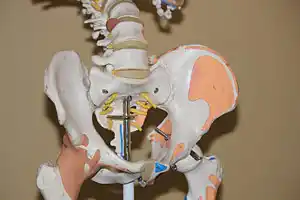Does Hip Replacement qualify for Disability?
Social Security does recognize hip replacements as a disabling impairment under Section 1.03 in its Blue Book though hip replacements are not mentioned specifically. You may qualify if certain conditions are met.

When a hip replacement may result in an inability to walk for a year, the patient may be eligible for Social Security Disability. For help from an experienced Long Term Disability Lawyer call 512-454-4000
Hip replacements are one of the most common joint replacement operations in the United States.
According to the American Academy of Orthopaedic Surgeons, approximately 300,000 hip replacement surgeries are performed each year, but although the procedure is very common, it is also a major surgery and carries some risks.
Hip replacement, or hip arthroplasty, is a surgery performed to remove a diseased or injured hip joint with an artificial joint made of metal and plastic components.
The most common reasons a person may have a hip replacement include:
- They have suffered a hip fracture;
- Arthritis causes severe pain and inflammation; or
- Natural wear and tear on the joint.
Hip replacement is usually performed when all other treatments to relieve pain and improve mobility have failed.
Signs that a person may need a hip replacement include:
- Pain in the hip even when not walking or standing
- Hip pain that prevents walking, climbing stairs, bending and performing daily routine tasks
- Stiffness in the hip that prevents lifting a leg
- Exhaustion of non-surgical treatments to provide relief.
Hip replacements do not last forever and the surgery does involve risks.
A patient should discuss with their doctor whether the procedure is right for them and carefully research the success history of a device. Among the risks a doctor will consider are a patient’s age, weight and other medical conditions, such as diabetes. Possible complications from hip arthroplasty include:
- infection
- bleeding
- need for additional surgery
- blood clots
- nerve injuries causing weakness, numbness or both
- dislocation
Contact a Social Security disability attorney at 512-454-4000 for a free consultation and see if you can get disability benefits while suffering from the effects of a hip replacement. If you have been denied disability don’t give up!
Most hip replacements are successful and a patient is able to put weight on their joints soon after surgery.
Because it is uncommon for a person to experience a loss of function and mobility for 12 months, it is unlikely that an individual applying for Social Security Disability Income would be considered disabled. However, Social Security does recognize hip replacements as a disabling impairment under Section 1.03 in its Blue Book though hip replacements are not mentioned specifically:
1.03 Reconstructive surgery or surgical arthrodesis of a major weight- bearing joint , with inability to ambulate effectively, as defined in 1.00B2b, and return to effective ambulation did not occur, or is not expected to occur, within 12 months of onset.
In order to qualify for SSDI with a hip replacement, an applicant must meet the following criteria:
- Applicant must have had hip replacement surgery;
- Applicant must not be able to walk well enough to work; and
- Applicant’s inability to walk must last 12 months.

Most candidates for hip replacement surgery already are facing limited mobility.
The reason why reconstructive surgery was done is not important.
A loss of function can be the result of bone or joint deformity or destruction from any cause. Social Security defines functional loss as “the inability to ambulate effectively on a sustained basis for any reason (including pain associated with the impairment) or inability to perform fine or gross movements effectively on a sustained basis for any reason.”
What does Social Security mean by “inability to ambulate effectively?”
- You cannot walk without using a walker or 2 crutches or 2 canes
- You cannot travel to work or school without the assistance of another person
- You cannot walk at a reasonable speed over a long enough distance to complete necessary, routine tasks such as shopping
- You cannot climb a few stairs at a reasonable speed with the use of one hand rail
- You cannot walk a block at a reasonable pace on rough or uneven surfaces
If you don’t meet Social Security’s requirements under reconstructive surgery of a major weight bearing joint, but you have had both hips replaced, Social Security will consider your residual functioning capacity (RFC) – what you are capable of doing despite your disabilities.
Any limitations you experience from your hip replacement and medical treatments will be evaluated. For example, Social Security may find that you can only work in a sedentary job, work that is done mostly while a person is seated and limits lifting of any objects to 10 pounds. However, even a sedentary job can require walking or standing at least two hours each day, so an applicant may not be able to perform even sedentary work. If Social Security determines that the symptoms associated with your hip replacement and treatments prevent you from doing any job, you may be awarded a “medical-vocational allowance.”
Additionally, you may be eligible for Social Security Disability benefits if you have another impairment; for example, high blood pressure or diabetes.
Applicants often have more than one illness or injury that prevents them from working full time. By itself one disorder may not meet the requirements of an impairment as stated in Social Security’s Blue Book. However, if an applicant has multiple medical conditions, Social Security must consider how those health issues, combined together, limit an applicant’s ability to hold a job and perform necessary daily tasks.
If you have had a hip replacement and it has prevented you from working, you may be eligible for Social Security Disability benefits.
A qualified Social Security Disability attorney can review your case, saving time and improving your chances of approval.
In order to qualify for Social Security Disability, you will need to satisfy a few specific requirements in two categories as determined by the Social Security Administration.
The first category is the Work Requirements which has two tests.
- The Duration of Work test. Whether you have worked long enough to be covered under SSDI.
- The Current Work Test. Whether you worked recently enough for the work to actually count toward coverage.
The second category is the Medical Eligibility Requirement.
- Are you working? Your disability must be “total”.
- Is your medical condition severe? Your disability must be “severe” enough to interfere with your ability to perform basic work-related activities, such as walking, sitting, and remembering.
- Is your medical condition on the List of Impairments? The SSA has a “List of Impairments” that automatically qualify as “severe” disabilities. If your disease is not listed this does not mean you cannot get disability, it means you must prove you cannot maintain employment due to your limitations.
- Can you do the work you did before? SSDI rules look at whether your medical condition prevents you from doing the work you did prior to developing the condition.
- Can you do any other type of work? If you cannot do your prior work, an evaluation is made as to whether you can perform any other kind of work.
More details can be found on our Qualifying for Disability page.
Disability benefits are an important source of income for those who are unable to work. If you are not able to work due to accident or illness, you may be eligible for Social Security Disability or Long Term Disability benefits. If you have applied for benefits and been denied, contact the attorneys at Bemis, Roach and Reed for a free consultation. Call 512-454-4000 and get help NOW.
Try these links for further reading on this subject:
Bulging Disc Back Pain can qualify you for Disability Payments
Cervical Degenerative Disc Disease can qualify you for Disability Benefits
How much does a Social Security Disability Attorney charge?
Author: Attorney Greg Reed has been practicing law for 29 years. He is Superlawyers rated by Thomson Reuters and is Top AV Preeminent® and Client Champion Gold rated by Martindale Hubbell. Through his extensive litigation Mr. Reed obtained board certification from the Texas Board of Legal Specialization. Greg is admitted to practice in the United States District Court - all Texas Districts and the United States Court of Appeals-Fifth Circuit. Mr. Reed is a member of the Travis County Bar Association, Texas Trial Lawyers Association, past Director of the Capital Area Trial Lawyers Association, and an Associate member of the American Board of Trial Advocates. Mr. Reed and all the members of Bemis, Roach & Reed have been active participants in the Travis County Lawyer referral service.

Your Free Initial Consultation
Call now:
At Bemis, Roach and Reed, if we can't help you, we will try to find the right attorneys for you.
We offer each of our prospective clients a free no obligation one hour phone or office consultation to see if we can help you and if you are comfortable with us. We know how difficult a time like this can be and how hard the decisions are. If we can be of assistance to you and help you find a solution to your issue we will even if that means referring you to another attorney.
Let's get you Started:
If you could provide us with some basic information about your claim we will get right back with you with a free case evaluation and schedule your Free Consultation Today.






